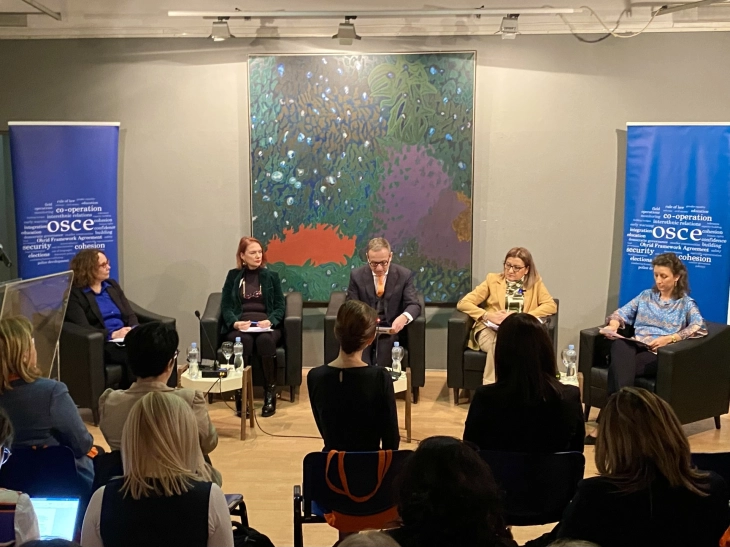Comprehensive approach and cooperation essential in prevention of gender-based and domestic violence: conference
- A comprehensive approach for the prevention, protection and ensuring effective prosecution of all cases of violence against women and domestic violence is essential. The cooperation between state institutions and civil society is also exceptionally important, concluded the speakers at the roundtable discussion “Prevent, Respond, Protect: Strengthening the Fight Against Gender-Based Violence in North Macedonia” hosted on Tuesday by the OSCE Mission to Skopje, as part of the 16 Days of Activism against Gender-based Violence campaign.
- Post By Angel Dimoski
- 14:35, 5 December, 2023

Skopje, 5 December 2023 (MIA) – A comprehensive approach for the prevention, protection and ensuring effective prosecution of all cases of violence against women and domestic violence is essential. The cooperation between state institutions and civil society is also exceptionally important, concluded the speakers at the roundtable discussion “Prevent, Respond, Protect: Strengthening the Fight Against Gender-Based Violence in North Macedonia” hosted on Tuesday by the OSCE Mission to Skopje, as part of the 16 Days of Activism against Gender-based Violence campaign.
The Head of the OSCE Mission to Skopje, Ambassador Kilian Wahl, said strengthening the role of the nongovernmental sector is especially important in the overall protection system, and that there is a “great need for adequate financing” in order to maintain the support services that provide protection to the victims of gender-based or domestic violence.
“We are promoting zero tolerance for all these occurrences. But, unfortunately, we are still witnessing greater and strengthened anti-gender movements. That’s why there is a need to come together and fight against this threat… As the Mission in Skopje, we are working alongside the nongovernmental organizations, the ministries, and we are in close cooperation with the other national institutions. The success of this initiative lies in comprehensive and coordinated support for women and survivors of gender-based violence, and cooperation between the institutions,” said Wahl.

Wahl welcomed the adoption of the changes to the Criminal Code in February, which criminalized various forms of gender-based violence, including psychological and sexual violence, stalking, following, and various forms of abuse. The Ambassador stressed that this represents progress in the fight against violence against women in North Macedonia.
“It’s not important to only change the law, but also to implement these provisions, and to carefully and rigorously enforce them… Our role as Mission is to improve the cooperation and coordination between civil society and the institutions, the goal is to work on an inter-institutional approach in order to identify comprehensive mechanisms for the protection of everyone from all forms of violence, as noted in article 9 of the Istanbul Convention,” said the OSCE Ambassador to North Macedonia.
According to the First Lady of North Macedonia, Elizabeta Gjorgievska, domestic violence is not a private affair, but a social concern that calls for a “coordinated response, a united voice that will reach those who are suffering in silence”. She said cooperation which goes beyond rhetoric and leads to concrete, transformative results is essential.
“Despite our best intentions, the numerous campaigns for raising awareness, legal obligations, the adopted legislation in this field, the figures point to the disappointing fact that not only is the situation not getting better, but it is also worsening. Since 2019, we’ve witnessed over 20 cases of femicide – the killing of a woman just because she is a woman, and represents the most extreme expression of violence against women. The majority of these victims suffered at the hands of their former or current partners or spouses, within the alleged safety of their homes,” said Gjorgievska.
Unfortunately, she stressed, the escalation of this phenomenon is growing increasingly concerning, pointing to the murder of 14-year-old Vanja Gjorchevska, which she described as “the most extreme type of violence that raises many different questions”.

The Minister of Labor and Social Policy, Jovanka Trenchevska, touching upon the legislation and commitments of the Government aimed at preventing violence, highlighted the ratification of the Istanbul Convention, which resulted in the adoption of the Law on Prevention and Protection from Violence against Women in 2021. “Apart from laws,” she said, “it is necessary to work with the victims, but also with the perpetrators”. She pointed to the importance of economic strengthening, education and mental health in the fight against violence.
Trenchevska announced that 13 shelters have been opened for women victims of family and gender-based violence in six planning regions, as well as 10 specialized counseling centers for victims, and eight for psychosocial treatment of perpetrators of domestic violence.
“The figures [of reported cases] haven’t changed over the years – in the past few years 1300-1500 reports have been registered annually. It is notable that psychological violence makes up the majority of reported cases. Unfortunately, in the area of the judiciary, we don’t have a large number of concluded court verdicts for violence against women, i.e., gender-based violence,” said Trenchevska.
Photo: MIA







